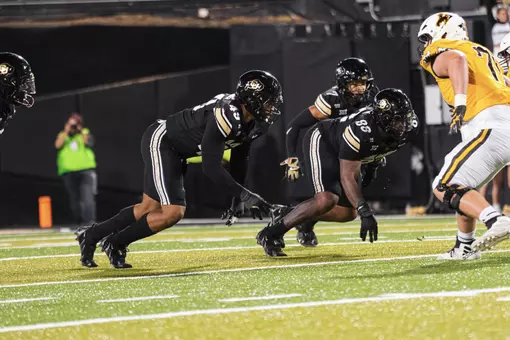Colorado University Athletics

Woelk: Takeaways From Buffs Vs. Air Force
September 15, 2019 | Football, Neill Woelk
BOULDER — Not long after Colorado's 30-23 overtime loss to Air Force on Saturday, the 24-hour rule kicked in for the Buffaloes.
Yes, it works both ways. Win or lose, Mel Tucker's 2-1 Buffs get some time to absorb the result, then move on to begin preparation for the next opponent.
There will be plenty to digest. The Buffs will learn from the miscues that cost them a victory against the Falcons; then begin preparing for next Saturday's Pac-12 opener at Arizona State (8 p.m., Pac-12 Networks).
Anyone who took the Sun Devils lightly after their less-than-impressive 19-7 win over Sacramento State in Week 2 is rethinking that position after their 10-7 win Saturday at Michigan State, a victory that rewarded Arizona State with a No. 24 ranking in the latest Associated Press poll. ASU was by no means a well-oiled machine on offense, but the Sun Devils' defense showed it is the real deal by posting its third straight game of holding an opponent to 7 points — the second-best scoring defense in the nation.
That's not great news for a CU offense that sputtered for more than half the game in Saturday's loss. Colorado scored a touchdown on its first possession, then did not reach the end zone again until less than seven minutes remained in regulation.
With that in mind, our weekly takeaways:
1. Offensive consistency is a big missing piece. As Colorado wide receiver Laviska Shenault Jr. said after Saturday's game, "When we were moving, we were moving. We're unstoppable. But little things just messed us up."
Indeed, when the Buffs were able to put the pedal to the metal, the offense was outstanding. CU's opening drive went 75 yards in 11 plays for a score, and the Buffs added 75-yard and 60-yard touchdown drives in the fourth quarter.
But in between, the offense churned in place. After a field goal off a turnover following the first touchdown, CU's next five possessions ended with four punts and an interception.
Saturday was not an aberration. Against Nebraska, it was seven straight empty possessions — six punts and an interception. And, while Colorado did manage to come back in both games with enough points to send the game into overtime, it's not a trend the Buffs can continue.
There's no single reason for the long lulls. Quarterback Steven Montez — who said after the game the blame for the struggles sits squarely on his shoulders — did not have his best game by far, but was certainly not the only reason for CU's inconsistencies. Penalties, sacks, missed assignments, missed blocks and missed receivers all fit into the equation. Everyone on the field played a part, and as Tucker emphasized time and again Saturday, it was a matter of consistency. It takes just one or two mistakes to blow up a drive, and the Buffs are committing too many of those mistakes.
2. Colorado's defensive takeaways are keeping the Buffs in games. The Buffs added three takeaways to their season's total Saturday, giving them 10 for the season — tied for second-most in the nation.
The total includes three interceptions by safety Mikial Onu, two of which have come in the end zone to stymie possible scoring drives by the opponent. Onu also has two forced fumbles while linebacker Nu'umotu Falo has proven to have a nose for the ball, coming up with three fumble recoveries.
The importance of the takeaways can't be overemphasized. They have provided momentum-shifting, game-saving moments, which the defense needs. That's because …
3. The Buffs' defense has to begin limiting explosion plays. In 12 quarters of regulation and two overtime periods this year, the Buffs have given up 12 touchdowns. Eight of those scores have come from 25 yards or farther, with five of them from 40 yards or more.
Air Force, a team with a reputation for grinding it out on the ground, hit the Buffs with touchdown passes of 81 and 32 yards, then added a 25-yard scoring run in the overtime period for the game winner.
Once again, it is a matter of consistency. It takes just one mistake to turn a good defensive stand into a big play for the opponent — and the Buffs have to figure out a way to reduce those big plays.
4. Colorado can't continue to wait until the second half to turn on the juice. After three games, the Buffs have scored nearly as many points in the fourth quarter — 51 — as they have in the first three quarters combined (55). That includes a scoreless first half against Nebraska and just 10 points in the first half against AFA.
Meanwhile, CU's defense has yielded 58 points in the first two quarters and just 27 in the third and fourth periods (plus one OT touchdown). Colorado's defense has been particularly stout in the third quarter, giving up just three points.
That's the lack of consistency Tucker emphasized. The Buffs have shown they can play well on both sides of the ball in every game, but they have had to rally from a deficit in all three games this year. Saturday, they tempted fate once too often and paid the price.
5. CU's coaches aren't afraid to make in-game lineup changes. When the Buffs scored their two fourth-quarter touchdowns Saturday, there were two new faces up front in place of the game's starters. Freshman guard Casey Roddick, who played much of the second half, and sophomore guard Chance Lytle were both on the field for at least part of the scoring drives.
The pair give the Buffs some additional size in the trenches. Roddick is listed at 330 pounds; Lytle at 320. There's no way of knowing if they will earn starts this week, but they no doubt did some good things when given the opportunity.
Also getting the first extensive playing time of his career was junior inside linebacker Akil Jones, who stepped in for a hobbling Jonathan Van Diest. Jones proved to be stout against the run, finishing with five tackles, including four solo stops.
And, tight end Jalen Harris — who plays regularly when Colorado goes with two tight ends — got some time as the solo tight end and finished with four catches for 22 yards.
6. When the run game is working, the offense is more consistent. Colorado finished with just 105 yards on the ground Saturday, and 56 of those came on CU's last two possessions of regulation, both of which finished with touchdowns on drives that covered a total of 135 yards.
It goes back to Tucker's goal of running the ball on their terms. When the Buffs can mash people consistently up front and put themselves in short-yardage situations, it gives Montez more of a chance to succeed.
7. Shenault is one of the most versatile players around. In CU's first two games this year, opposing defenses did everything possible to take the Colorado star out of the game. The result was CU simply turned to the other playmakers.
Air Force, though, decided to play a little more man-to-man coverage on Shenault, and he produced his best game of the year thus far, an eight-catch, 124-yard, one touchdown day. Shenault also ran three times for 25 yards and a score, including a 19-yard run on fourth down.
Now the key for CU will be to keep everyone else involved and still get the ball to Shenault in big moments. They did a reasonably good job Saturday; if they can take the next step it will help the offensive consistency.
8. Some young players are quietly becoming steady contributors. Tops on this list Saturday were freshman running back Jaren Mangham (10 carries, 56 yards) and redshirt freshman receiver Dimitri Stanley (five catches, 35 yards and a score). These are young players whose roles will likely only continue to grow.
You can also throw linemen Roddick and Lytle (mentioned earlier) into that group, along with freshmen defensive linemen Na'im Rodman and Austin Williams and sophomore Janaz Jordan. The three young D-linemen are providing solid steady relief, one reason CU's defense has had relatively fresh legs after halftime.
9. Tucker isn't a coach to throw his players — or staff — under the bus. This might not seem like much, but it's a big deal to players. They notice when a head coach is quick to blame others for a loss, and it's an attitude that can spread quickly through a locker room.
In that same vein, Tucker also isn't a coach to sell alibis, something else players notice. When the head coach says his team has to play better — and makes it clear it is his job to coach them to that point — his players respond accordingly. They know their coach has their back, but they also know they will be held accountable.
That's a foundational building block for a successful program.
10. Tucker isn't afraid to shoulder the responsibility of improvement. Since the day he arrived, Tucker has been rebuilding a culture of hard work, discipline and toughness. It showed up again Saturday when the Buffs overcame a 13-point deficit in the fourth quarter to force overtime.
Now, they have to take the next step, the one that will require more than just effort and will. The Buffs have to develop consistency, and Tucker says that will be his responsibility.
"This is not a final situation," Tucker said. "We are continuing to work with this football team. We have tremendous upside and we have to figure out a way to get it out of them. That is why they call us coaches."
Contact: Neill.Woelk@Colorado.edu


















